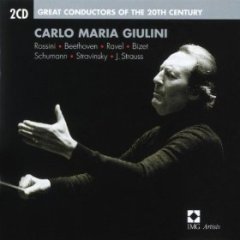Great Conductors of the 20th Century Vol.18 - Carlo Maria Giulini
Great Conductors of the 20th Century Vol.18 - Carlo Maria Giulini

CD1 1. Rossini - Tancredi Overture (06:34) Beethoven - Symphony No.7 in A Major 2. I. Poco sustenuto - Vivace (15:08) 3. II. Allegretto (09:32) 4. III. Presto (08:16) 5. IV. Allegro con brio (07:43) Ravel - Ma Mere l'oye 6. I. Pavane de la Belle au bois dormant - lent (01:53) 7. II. Petit Poucet - Tres modere (03:59) 8. III. Laideronnette, imperatrice des Pagodes - Mouvement de marche (03:55) 9. IV. Les Entretiens de la Belle et de la Bete - Mouvement de valse modere (04:47) 10. V. Le Jardin feerique - Lent et grave (04:09) Bizet - Jeux d'enfants 11. I. Marche (Trompette et tambour) (02:28) 12. II. Berceuse (La Poupee) (02:29) 13. III. Imprompou (La Toupie) (01:03) 14. IV. Duo (Petit mari, petite femme) (03:14) 15. V. Galop (Le Bal) (01:35) Philharmonia Orchestra (1, 11-15) Chicago Symphony Orchestra (2-5) Symphonieorchester Des Bayerischen Rundfunks (6-10) Carlo Maria Giulini - conductor CD2 1. Beethoven - Egmont Op. 84 Overture 8:50 Robert schumann - Symphony No. 3 in E flat major Op. 97 'Rhenish' 2. I. Lebhaft 9:58 3. II. Scherzo (Sehr mäßig) 6:17 4. III. Nicht schnell 5:20 5. IV. Feierlich 5:05 6. V. Lebhaft 5:46 Igor Stravinsky - L'Oiseau de feu - Suite 7. I Introduction & L'Oiseau de feu et sa danse 3:27 8. II Variation de l'oiseau de fue 1:22 9. III Ronde des princesses. Khorovode 5:18 10. IV Danse infernale du roi Kastcheï 4:41 11. V Berceuse Carlo Maria 3:57 12. VI Finale 3:12 13. Johann Strauss - Kaiser-Walzer Op. 437 11:58 Orchestra Sinfonica Della Radio Italiana (1) Philharmonia Orchestra (2-12) Wiener Symphoniker (13) Carlo Maria Giulini - conductor
Carlo Maria Giulini’s later recordings, from the early 1980s on, sometimes seem like studies in immobility. So EMI’s selections in its Giulini Great Conductors set wisely cover the years from 1954 to 1979. Not surprisingly, the earliest ones, like the exquisitely colored Stravinsky Firebird Suite with the Philharmonia from 1956, show a vital conductor who delivers a knockout punch in the Infernal Dance. The same Kingsway Hall sessions produced a Bizet Jeux d’enfants full of wit and rhythmic life, with a scintillating closing Galop. The Bizet and a live 1974 Ravel Mother Goose Suite from Munich are further reminders of Giulini’s knack for extracting ravishing orchestral colors.
The program opens with a terrific version of Rossini’s Tancredi Overture from 1964, distinguished by its rhythmic vitality and shapely phrasing. I fondly recall this recording from an old French EMI LP issue devoted to Rossini and Verdi operatic overtures and orchestral excerpts, welcoming it like an old friend even as it set me wondering why Tancredi is the set’s only work by an Italian composer as well as its only nod to Giulini’s distinguished work in opera. Add an idiomatic live Vienna 1974 Johann Strauss Kaiser-Waltz and at first glance the bulk of the set appears an attempt to counter Giulini’s latter-day image as a philosophically inclined conductor seeking ultimate truths in his self-admittedly smallish repertoire.
But the German heavyweights do slightly exceed half of the generous total playing time on these discs. Beethoven is represented by two works. Less than ideal balances and brass playing are minor blemishes in a dramatic live 1968 Egmont Overture with Turin’s Radio Symphony Orchestra. But the 1971 Beethoven Seventh with the Chicago Symphony shows Giulini at his best–a vibrant performance with a powerful first movement, an aptly serious Allegretto reminiscent of Klemperer’s, and the final two movements played with brilliance and power. While Giulini gives us a nice combination of weighty earnestness and forward thrust, others have accentuated the dance component of the symphony to a greater degree. The Chicagoans also supply the virtuosity and brash edginess that enhance the symphony’s drama. With the Philharmonia in 1958, Giulini’s Schumann “Rhenish” Symphony in Mahler’s reworked orchestration gets a vigorous performance, more involving than his staid Los Angeles version from 1981. Unlike many others in this series, everything on these discs is vividly recorded–one of the side benefits of choosing a conductor active in the heyday of analogue engineering. ---Dan Davis, classicstoday.com
download:








